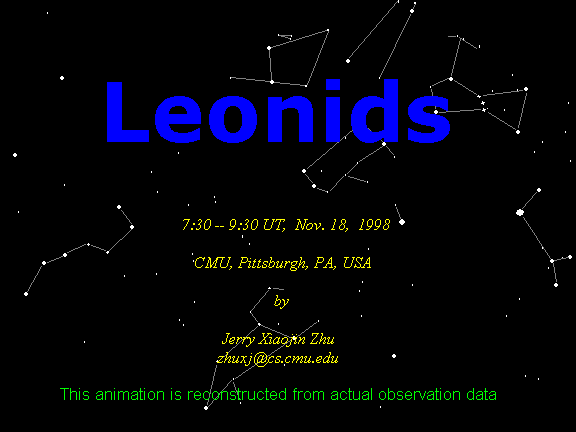
| < |
Home / |
Astronomy / |
Meteors / |
Leonids / |
1998 |
> |
|---|
I recorded the timing and start/end position of each meteor I saw. Based on this data, I created (frame by frame!) the following animation. It is almost exactly what happened that night, except the time is warped from 2 hours to 20 seconds ... Enjoy!
 |
| Animated 1998 Leonids meteor shower |
Jerry Xiaojin Zhu, Carnegie Mellon University Astronomy Club
Time: Nov.18 7:30-9:30 UT (2:30am -- 4:30am EST local time)
Location: Pittsburgh, PA 15213, USA (40 26 24, 80 00 00)
We saw 15 meteors, 2 of them are NOT Leonids.
| UT | Number | Mag. | comment |
| 7:30 | 1 | 3 | |
| 7:40 | 2 | 1,2 | |
| 7:50 | - | ||
| 8:00 | - | ||
| 8:10 | 2 | -2,2 | |
| 8:20 | 1 | 0 | |
| 8:30 | 1 | 0 | |
| 8:40 | 4 | 2,0,1,-1 | |
| 8:50 | - | ||
| 9:00 | 1 | 2 | Not Leonid |
| 9:10 | 2 | 2,1 | one of them not Leonid |
| 9:20 | 1 | 0 | |
| 9:30 | END |
Sky limit: 4.0 in the clearest part. However most of the sky was under light fog, sometimes can't see 3.0 stars.
Clouds: 7:30 UT 50%; 8:10 UT 20%; 8:40 UT 5%; 9:10 UT 0%
Orientation: We were looking towards East. Can see Ursa Major, Leo, Canis Major, Gemini, Orion and Auriga in the field of view.
Comments: It's pretty cloudy at 2am(local) and cold, yet 20 to 30 university students already gathered at Shenley park near Carnegie Mellon campus, laying on the ground to see the meteors(our club made meteor shower advertisement a few days ago). "Ah" and "Ooh" whenever a meteor showed up... We didn't see any dim meteor at all. We didn't see very bright fireball either. The brightest meteor was about -2, with a greenish trail lasted for one second.
| < |
Home / |
Astronomy / |
Meteors / |
Leonids / |
1998 |
> |
|---|